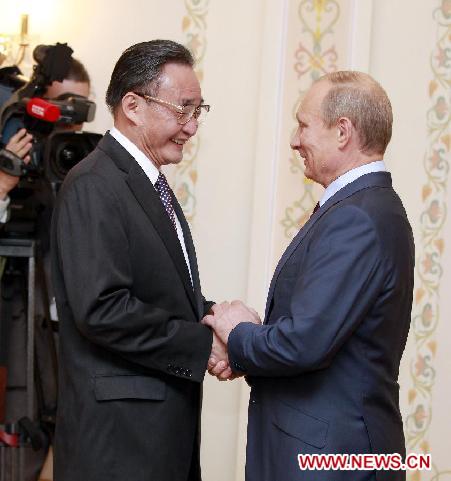China, Russia pledge to build deeper trade relations
 0 Comment(s)
0 Comment(s) Print
Print E-mail
Xinhua, September 15, 2011
E-mail
Xinhua, September 15, 2011
Visiting Chinese top legislator Wu Bangguo said in Moscow Wednesday that China would work with Russia to deepen pragmatic cooperation and build a close, long-term and sustainable economic and trade relationship.
Wu, chairman of the Standing Committee of China's National People's Congress (NPC), made the remarks in a meeting with Russia's Prime Minister Vladimir Putin.
Wu arrived in Moscow earlier Wednesday for an official goodwill visit, his fourth tour to Russia as chairman of the Chinese NPC Standing Committee.
Wu first conveyed greetings from Chinese President Hu Jintao and Premier Wen Jiabao to Putin, saying China is ready to make joint efforts with Russia to lift bilateral ties, better maintain common interests of both countries and bring benefits to the two peoples.
"Sino-Russian relationship has seen unprecedented progress and bilateral cooperation in various fields has reached an unprecedented level" since the two countries signed the China- Russia Treaty of Good-Neighborliness, Friendship and Cooperation in 2001, said Wu.
Given the complex and volatile international situation, Wu said it is of vital importance to enhance Sino-Russian strategic trust and cooperation for safeguarding core interests of both countries, such as sovereignty, security and development.
"China will as always make Sino-Russian relations as its foreign policy priority and treat bilateral ties from a strategic height and long-term perspective," said the Chinese top legislator.
Wu's Moscow trip came just three months after Chinese President Hu Jintao traveled to Moscow to mark the 10th anniversary of the signing of the China-Russia Treaty of Good-Neighborliness, Friendship and Cooperation.
The Chinese president and Russian leaders made a blueprint for development of the bilateral relationship in the next decade, pledging to build a comprehensive, strategic partnership of cooperation.
On the economic and trade front, Wu urged the two nations to take the opportunity in expanding pragmatic cooperation in a comprehensive manner, which he said constitutes a material foundation for bilateral ties.
"As the world's major emerging economies, China and Russia enjoy complementary advantages in areas like capital, technology, market and manpower resources," said Wu, putting forward proposals for furthering trade cooperation between the two neighbors.
For a start, the two countries should promote cooperation in major projects and expand trade on mechanical/electrical and high- tech products in a bid to meet the target of increasing trade to 100 billion U.S. dollars by 2015 and 200 billion U.S. dollars by 2020, said Wu.
Secondly, the two countries should strive to establish energy cooperation partners by speeding up construction of national gas pipelines, securing stable operation of crude oil pipelines and facilitate cooperation on nuclear power, coal, electricity and new energy.
Wu also called on the two sides to enhance high-tech cooperation and work on regional cooperation by increasing cross- border infrastructure construction and studying the possibility of setting up trade cooperation zones.
Putin said China is Russia's reliable cooperation partner, adding that it is important to further advance Russia-China strategic cooperation partnership under current circumstances.
Russia attaches great importance to relations with China and would work with China to facilitate friendly exchanges between governments, parliaments and parties so as to boost bilateral ties in a comprehensive way, said Putin.
During the four-day stay in Moscow, Wu is also expected to meet Russian President Dmitry Medvedev and attend the fifth meeting of the China-Russia parliamentary cooperation committee, the highest- level regular meeting mechanism between China's top legislature and a foreign parliament.
The parliamentary meeting will be co-chaired by Wu, Chairman Boris Gryzlov of the Russian State Duma, and Acting Speaker Alexander Torshin of the Russian Federation Council. Russia is the first leg of Wu's four-nation Eurasian tour, which will also take him to Belarus, Uzbekistan and Kazakhstan.






